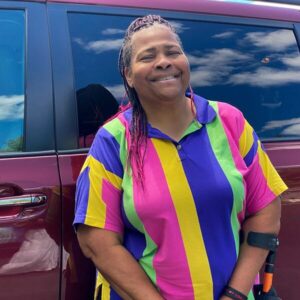Almost 5 million Americans are currently living with heart failure with 550,000 new cases diagnosed each year. 3,552 heart transplants took place in 2019, an increase of 4.2% from the year before. To recognize World Heart Day on September 29, we spoke with Katherine Boyd, a Help Hope Live client who is waiting for a new heart.
Kathy and daughter Jasmine on Mother's Day
Tell us a little bit about your community.
I have been married to my husband for 36 years. We have two children, a daughter and a son. I am the oldest of five children. My stepmom, sisters, and their families are very supportive of me and my family—they have taken this journey with me.
I have worked at Riley Children’s Hospital, the largest children’s hospital in Indiana, for three-and-a-half decades. I am also very involved in my local church.
Kathy has a large and supportive family
When did you first learn that you were experiencing heart failure?
I was diagnosed with heart failure in June of 2000. I was shocked, frightened, overwhelmed, and in disbelief. I prayed, asking God for one thing: to be able to raise my kids. I also began to do everything my medical team instructed me to do.
I recovered some heart function and was doing well until 2018, when my ejection fraction dropped to 20 percent. I found out that I might need a heart transplant in 2019.
How did your life change?
Every aspect of my life has changed. I have a weight limit, daily medications, dietary changes, and an exercise program to follow. I could not lift more than 25 pounds, vacuum, or mow the lawn. I had to learn what I could tolerate before becoming fatigued. I had to stop trying to survive on five hours of sleep per night.
One of the biggest changes was finding a new position at my job that could accommodate certain restrictions. In my career as a nurse, I had to find less physically challenging and stressful settings. I felt I had a limited ability to change employers because now I had a “pre-existing condition,” and I could not afford any lapse in insurance coverage.
How did your community respond?
My family was immediately very supportive of me. They live two hours away but made the drive to help me. My kids were frightened but resilient. My husband has stood by my side every step of the way and has taken on many extra responsibilities in our household.
My co-workers visited me in the hospital, called, and sent cards and flowers, and my church family covered me with their prayers.
Kathy's community offered an outpouring of support
When did fundraising enter your story?
My transplant team met with me to lay out all the expenses, testing, and insurance coverage I would need to move forward with a heart transplant. One of the biggest costs I will face is the cost of the medications that will help prevent transplant rejection and other complications. Other financial challenges will be meeting my monthly bills and assisting my caregivers, who will have to leave their job at a moment’s notice to help me during my recovery.
The transplant team strongly recommended that I do some fundraising, and Help Hope Live was the organization that they directed me towards for heart transplant fundraising.
On World Heart Day, what would you like readers to know?
Please don’t forget that no matter how they look, heart failure patients have limitations. They are “sicker than they appear.” I challenge everyone reading these words to take care of themselves and live a heart-healthy lifestyle.
I want people to know that heart failure doesn’t mean I’m going to pass away at any moment—there are treatment options and pathways for me to explore.
Kathy with husband Otis
On my Campaign Page, my sister wrote, “It’s not what happens in your life—it’s how you handle what happens.” In each of our lives, we will face obstacles and disappointments. We have to decide how we are going to cope with them. Our response is the one thing we can control. It makes me feel good that my sister saw in me a determination to win this battle.
No one expects or plans to find themselves in this situation. Personally, I would much rather be submitting donations than receiving them! Your generosity and support are greatly appreciated—not just by me, but by all of us who are striving to extend our life expectancy.
Kathy and family at her son Daniel's graduation
You can make a difference in Kathy’s life with a donation or Guestbook message at helphopelive.org.
Written by Emily Progin













